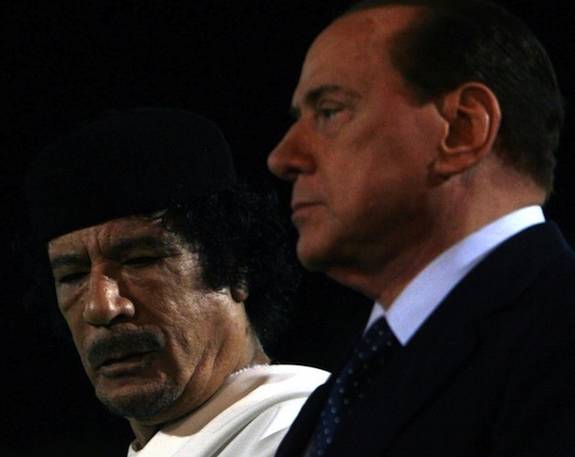


At the beginning Italy dragged its feet over reactions to Gaddafi’s brutal attacks on anti-regime demonstrators. The initial reaction of Premier Silvio Berlusconi was to say that he did not want to “bother” the Libyan leader with protests. Then, pressed by the U.S. and the European Union, Foreign Minister Francesco Frattini agreed to follow the lead of the EU, the United Nations and even the Arab League in calling for an immediate cessation of the murderous attacks. In an interview with the daily Corriere della Sera [2] on March 12, Italy, Frattini acknowledged that Italy needed to clear up “doubts and uncertainties” as to its position.
On that same day Gaddafi’s son Saif also gave an interview to La Repubblica [3], in which he spelled out the issues. Herewith textual quotes:
“We have been very unappy: you are Libya’s foremost world partner, the number one for natural gas, for petroleum and for trade, yet we have seen Italy remain silent in the face of those terrorists who killed our policemen in cold blood who tore the hearts from cadavers, who burnt them, who stamped on their hearts with their boots. Haven’t you see the videos of these scenes? I ask you Italians: show me the traces of the air bombardment! This is the time for true friends, and now Italy must change its position, understand that what you’ve heard over the past two weeks is false. Here is the message for Italy: the Libyan people are united, soon we shall win the battle against these terrorists, Insh’allah, and then we will take stock. It will be very easy to substitute Italy with China or Russia; China is asking us, they want to be our foremost [trading] partner. Beware.
“We are irritated by the Italian position. Berlusconi is our friend. We are close, we are friends. We could have expected this from France, Great Britain, Sweden, but not Italy. The Chinese back us, the Brazilians, Russians, South Africa, but whatever happened to the Italians? We have a common future. If we lose the battle here, you are next. If we win, you will be safe…. Libya is a front line for Italy. What happens today here will decide what will happen tomorrow with you. So—beware.”
It will not be easy for Italy to ignore these all too open threats. Saif is telling the turth about a “common future.” In fact, discussion of creating a no-flight zone over Libya stalled Tuesday at the G-8 meeting in New York, where the U.S. was cautious and Italy among those opposing. According to the New York Times, Frattini was in opposition, explaining that Russia had argued that a no-flight zone would be ineffective and even counterproductive.
For the moment, Italy is therefore bowing to EU pressure, but keeping its distance from the leader at least treated as a friend in past years is difficult. Foreign policy leaders are deeply uneasy about what they are to do if and when Gaddafi successfully shuts down the opposition. For Italy, it is a tough call: most hearts are with the anti-regime demonstrators, but the pocketbooks—the suits—are with Gaddafi, as are concerns over energy requirements, all the more aggravated by the new EU fears over nuclear power. The closer Gaddafi’s heavily armed military and police goons close in on the rebels, the harder that choice becomes for Italy.
It seems only yesterday—well, actually, nine months ago—that 500 women turned up in Rome to hear Muammar Gaddafi give a specific address on a sweltering day in June. The Libyan leader’s stated purpose when asking the Italians to provide an all-female audience was “to save women,” and those enthusiasts who attended did not seem at all to mind either his paternalistic posture, his bad hair day or his all-female corps of bodygaurds. Indeed, in this, his third visit to the country, Gaddafi was given star treatment and plenty of lusty applause from the well groomed businesswomen and female politicians. He had arrived for the state visit with thirty horses (just why is unclear) and a gigantic tent, which was raised in that portion of the Doria Pamphilj park in Rome which that family had genously donated to the Italian state in the Seventies; inside that tent at midnight one night Premier Silvio Berlusconi paid a friendly visit to the Libyan leader.
Reports from a hotel owner on Capri that one of Gaddafi’s other sons had drunkenly trashed a room were politely ignored.
Statistics explain why. Almost one-third of Libyan oil (32%) comes to Italy and another 12% of its gas is purchased by Italy. The quality of that oil, not coincidentally, is considered extremely high, moreover, which explains why the world’s airline fleets—including those in the U.S.—prefer Libyan crude. Altogether, Italy resolves 80% of its energy requirements through Italy. In return, Libya buys more of its weapons from Italy than from any other nation. According to a January 2011 report by the European Union, Italy provides a third of weapons sold to Libya from EU countries, in the amount of $153 million in 2009, the latest statistics available.
Libya owns a hearty stake in UniCredit, the former Banco di Roma, and in a soccer team. Countless other private and public companies hold fat contracts for construction projects. The quid pro quo: a formal agreement that Libya would do its utmost to block emigrants from heading toward Italy via Libya. And in 2010 Italy gave Libya $5 billion as compensation for its 32 years of colonial rule that ended in 1943.
Source URL: http://test.casaitaliananyu.org/magazine/focus/op-eds/article/gaddafi-once-and-future-friend
Links
[1] http://test.casaitaliananyu.org/files/1692611300302026jpg
[2] http://www.corriere.it/
[3] http://www.repubblica.it/